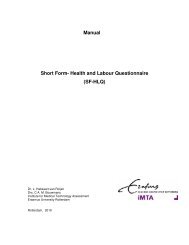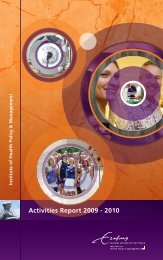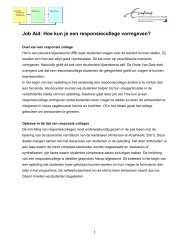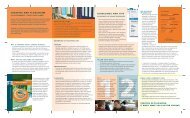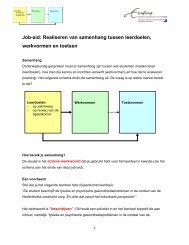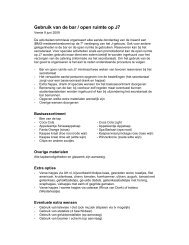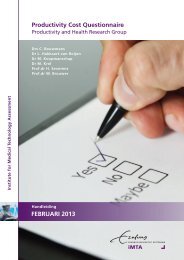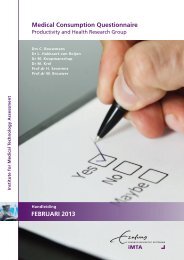Marten J. Poley - Erasmus Universiteit Rotterdam
Marten J. Poley - Erasmus Universiteit Rotterdam
Marten J. Poley - Erasmus Universiteit Rotterdam
- No tags were found...
Create successful ePaper yourself
Turn your PDF publications into a flip-book with our unique Google optimized e-Paper software.
128Chapter 8compare our results with those from a recent HRQoL study in 45 adults born withCDH from Finland, also using the SF-36 questionnaire. 5 The HRQoL of 27% of thepatients was considered poor, as their score on one or both SF-36 summarymeasures was 1 standard deviation lower than the average score found in healthycontrols (which exceeded the figure of 16% expected beforehand). We arrived ata somewhat better but quite similar result: 16% of our adult patients with CDHhad a score on one or both of the SF-36 summary measures of more than 1standard deviation below the average reference score. Our study in CDH has notyet been followed by still other similar long-term HRQoL studies. Yet, it remainsrelevant to follow patients with CDH and to study long-term HRQoL, with thepurpose of improving clinical management and informing the patients and theirparents. After all, the present adult patients were born decades ago in a timecharacterized by a survival of the fittest, with the most critically ill patients dying.In the present, it is possible to keep more patients with relatively severeconditions alive, so long-term HRQoL may be poorer than observed in our cohort.Two additional observations on the follow-up of patients born with surgicaldiseases may be made. First, in recent years it has been recognized that thisgroup of patients—especially those with major anomalies—requires long-termperiodic follow-up, using a multidisciplinary, coordinated approach from surgeons,neonatologists, pediatricians, psychologists, dieticians, and social workers forexample. 6 As scientific knowledge advances, follow-up will become even moreencompassing. When, for example, information on the (genetic) etiology of theanomalies improves, it will be possible to provide accurate genetic counseling towomen who consider pregnancy, which is an increasingly common event inwomen treated for neonatal surgical diseases. Given that the etiology of themajority of the anomalies treated by pediatric surgeons is considered to besporadic or multifactorial, genetic counseling is important in enabling riskassessment and focused and timely consultation for prenatal ultrasound, amnioticfluid sampling, etc. Furthermore, a recent advancement is the increasingawareness of the value of preconceptional counseling as an integral part of thecare for these former patients and their families. Preconceptional interventionssuch as folic acid supplement use (to reduce the risk of neural tube defects) orsmoking cessation programs have the potential to improve the pregnancyoutcome in these women—just as, of course, in all other women of reproductiveage. 7,8Second, attempts should be made to avoid a circumstance that may particularlyhinder follow-up, namely the fact that pediatric surgeons generally lose contactwith their patients as they become adults. The patients may continue having theircheck-ups with the pediatric specialist, but often the care is transferred to 'adult'doctors (e.g., surgeons, urologists, or gynecologists) or the patients 'drop out' ofmedical follow-up. A recent study in patients with ARM from the Netherlandsreported that the follow-up of 34% of the adult patients was transferred frompediatric to adult surgeons. Of these patients, 31% encountered transfer



